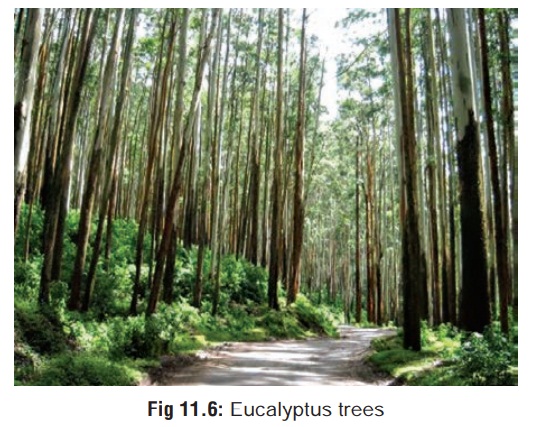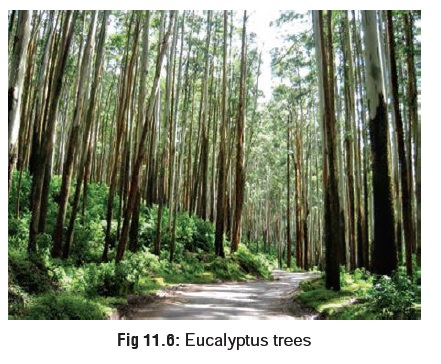Chapter: Modern Medical Toxicology: Organic Poisons (Toxins): Plants of Special Importance
Eucalyptus - Organic Poisons (Toxins)

Eucalyptus
Other Common Names
·
Blue gum tree.
Botanical Name
·
Ececalyptus
globulus
Physical Appearance
·
Eucalyptus
globulus is a tree that grows well in the Nilgirisarea in South
India.
·
The bark of the tree is smooth, and
leaves are long and curved.
·
Eucalyptus oil is obtained from the
leaves and young shoots.
o The
oil is volatile, pale yellow or clear, with a distinc-tive fragrant odour and
pungent, cooling taste.
o It
contains about 38 to 65% of eucalyptol (cineole), a monoterpenoid substance, as
well as alpha pinene, phellandrene eudesmol, and other terpenes.

Uses
·
The oil is used in folk medicine for
a variety of ailments (particularly those related to respiratory tract).
Clinical Features
· Burning of mouth, abdominal pain,
vomiting, diarrhoea.
· Bronchospasm, bronchorrhoea,
tachypnoea, chemical pneumonitis, apnoea.
· Vertigo, slurred speech, delirium,
ataxia, headache, drowsi-ness, coma. Sometimes convulsions occur. Pupils are
often constricted. Mydriasis is encountered less commonly.
· Tachycardia, hypotension.
· There is odour of eucalyptus in the
breath.
· Aspiration of the oil results in
chemical pneumonitis, with fever, dyspnoea, cyanosis, rales, and rhonchi.
· Contact dermatitis and urticaria
have been reported in sensi-tive persons after handling the foliage and other
plant parts of Eucalyptus globulus.
Usual Fatal Dose
·
About 4 to 5 ml.
·
However, survival has been reported
with 20 to 30 ml in children, and 120 to 240 ml in adults.
Treatment
·
Symptomatic and supportive measures.
·
Emesis is NOT recommended due to
potential for aspiration, CNS depression, and seizures.
·
Activated charcoal is beneficial.
·
If the patient is coughing upon arrival at the hospital,
aspi-ration may have already occurred. Monitor arterial blood gases in cases of
severe aspiration pneumonitis to assure adequate ventilation. Obtain baseline
chest x-ray and vital signs.
· Mechanical ventilation may be
required in cases of severe respiratory depression or aspiration.
· Mannitol, peritoneal dialysis, and
haemodialysis were successfully used in some cases of substantial ingestion.
Related Topics